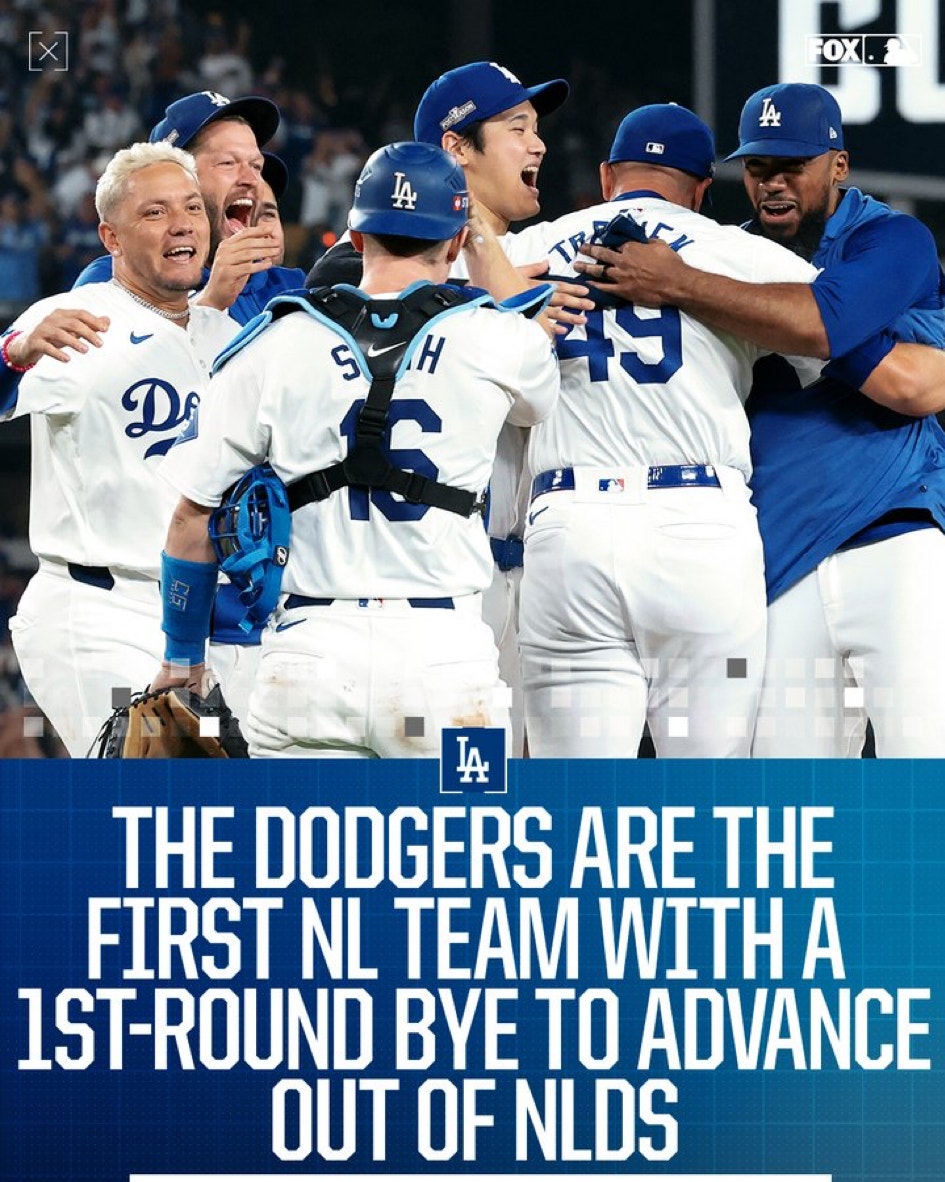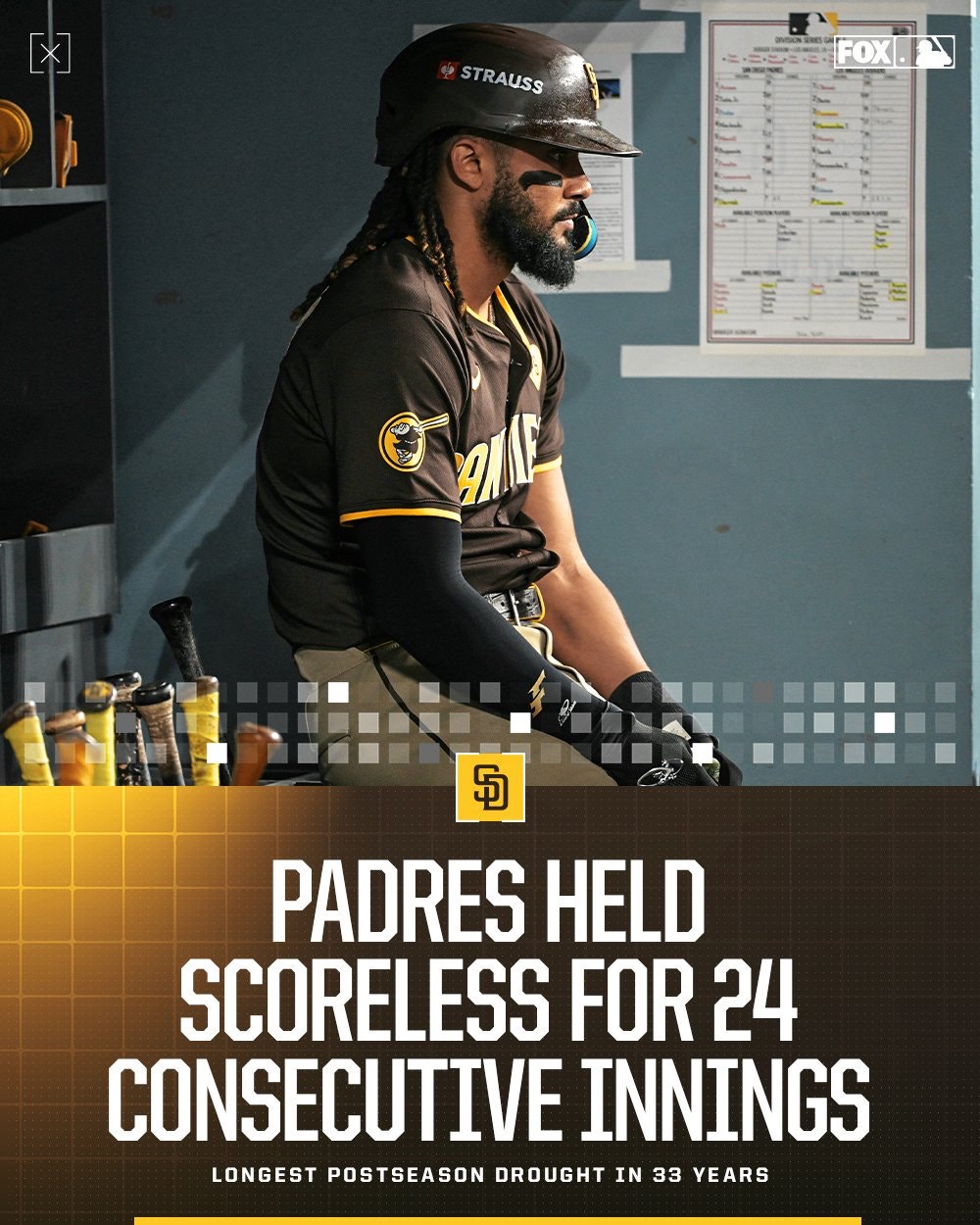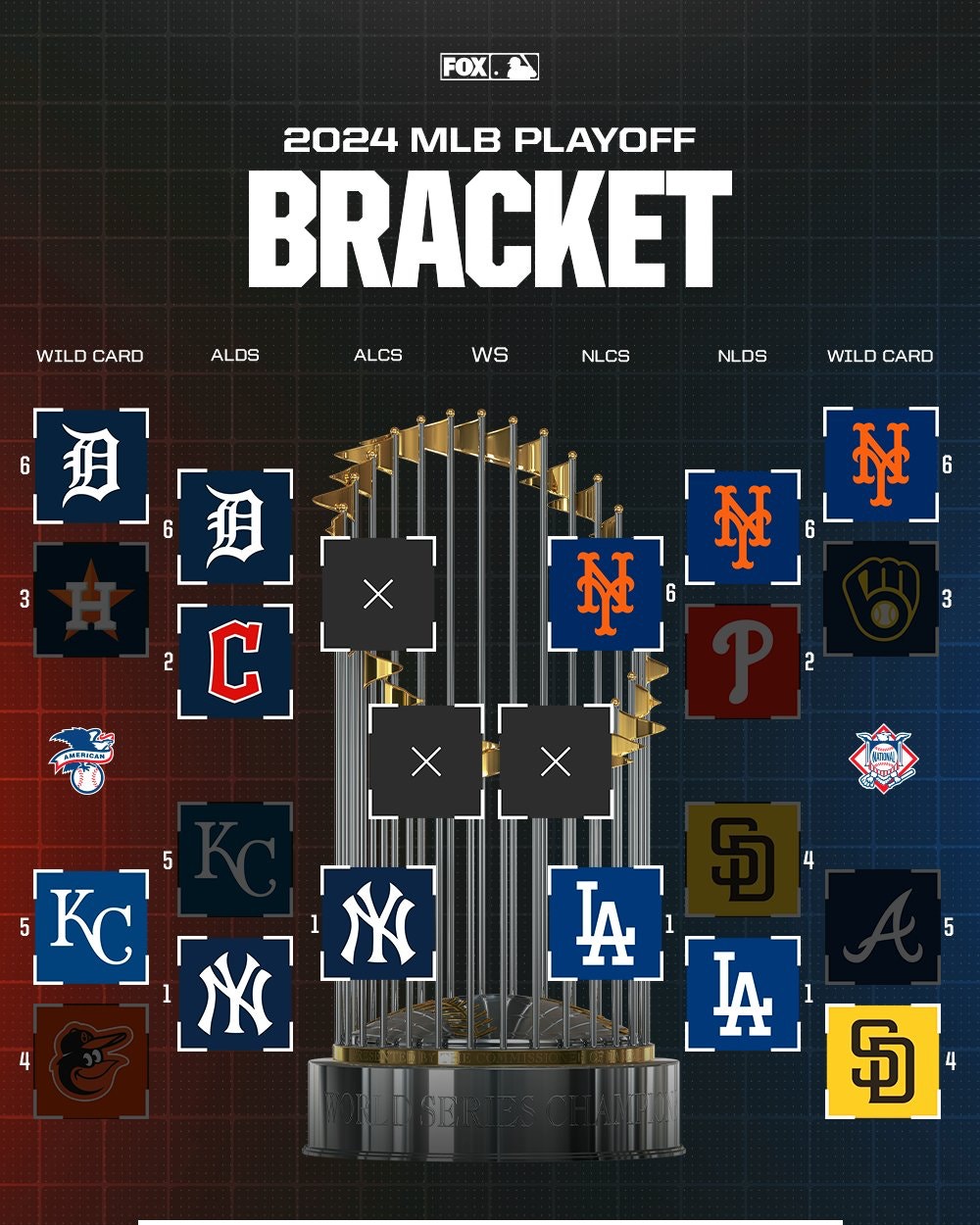[ad_1]
LOS ANGELES — Dave Roberts walked into the postgame press conference Friday night with a cigar clutched between his fingers, his voice hoarse from the revelry. As a player in 2004, his series-flipping steal helped the Red Sox overcome a 3-0 deficit in the American League Championship Series en route to winning a World Series. As a manager in the 2020 pandemic-shortened season, his Dodgers overcame a 3-1 deficit in the National League Championship Series against the Braves en route to snapping the franchise’s 32-year title drought.
And yet he put this National League Division Series comeback against the Padres, which included consecutive shutout wins in elimination games and 24 consecutive scoreless innings from the Dodgers’ embattled pitching staff, in the same conversation as those successes. After losing to a lower-seeded division rival in the first round the previous two seasons, it would not happen a third time as Los Angeles knocked out San Diego 2-0 on Friday to advance to the NLCS versus the New York Mets.
“This is right there with it,” Roberts said. “To kind of win this series how we did, to kind of fall behind — and those guys coming into the postseason had a lot of momentum — speaks to the character of our guys. This is right up there.”
Before Game 5, Roberts told his players that he believed in this team more than any team he’d ever coached.
“I just think that there’s a relentlessness, a refusal to lose,” Roberts said.
Their first baseman, Freddie Freeman, was playing on one leg. Their shortstop, Miguel Rojas, left Game 3 early and never returned to the series, hindered by the torn adductor he had attempted to play through. Injuries had ravaged their starting pitching, enough that they only had one member of their Opening Day rotation still available in October.
For many of those reasons, the Padres, who had lost the division but finished with the best second-half record in baseball, were viewed by many as the better club. Within the Dodgers’ clubhouse, a mantra began to form, stemming from a message Kiké Hernández delivered when the team was down 2-1. It continued to be spread throughout the clubhouse as Kendrick Lamar’s “Not Like Us” blasted through the speakers Friday night.
“F— ’em all,” Max Muncy said.
The one starter still standing, Yoshinobu Yamamoto, missed nearly three months with a rotator cuff strain and had thrown five innings just one time in his four regular-season starts back from injury. He got walloped by the Padres in his major-league debut in March and then again this past Saturday in Game 1 of the NLDS, enough that the Dodgers thought he might have been tipping his pitches. They attempted to clean up the issues before Game 5, when they decided to go with Yamamoto again.
“In talking to him, you could get the sense that he wanted the ball,” president of baseball operations Andrew Friedman said.
But the choice was not a given and was not announced until 9:31 p.m. PT the night before Game 5. They could have tabbed Jack Flaherty, their prized deadline acquisition. Or they could have used another bullpen game after it worked masterfully against the Padres two nights prior. All of their relievers were available again in another elimination game.
But not giving Yamamoto the ball with the season on the line would have sent a bad message to the player they had just made the highest-paid pitcher in the sport.
“At the end of the day,” Roberts said, “we’re making a bet on a guy to pitch the game of his life tonight.”
Yamamoto had big-game experience in the past, both from earlier this year and his career internationally. His best outing as a major-leaguer came in the Bronx, when he held the Yankees scoreless through seven innings on June 7. The 26-year-old also pitched in the World Baseball Classic. Roberts considered pitching for Japan, and a player’s country, “the highest stakes that you can have.”
In addition to winning the Nippon Pacific League MVP and triple crown three straight years, Yamamoto also led the Orix Buffaloes to the Japan Series three straight seasons. Last year, he faltered in a Game 1 loss in which he surrendered seven runs. He got the ball again in Game 6, with the Buffaloes down 3-2 in the series, and struck out 14 batters in a 138-pitch complete game.
He would not need to throw nearly that many pitches to give the Dodgers exactly what they needed.
“Yoshinobu is here to be a top-end starter,” Robertse said, “and this is his time.”
Before Yamamoto reached the top step on his final walk off the mound Friday, Roberts slapped his hand and gave him a hug. A parade of high-fives awaited in the dugout. Shohei Ohtani rubbed Yamamoto’s head and laughed. The Dodgers had made it to this point without needing a starter to step up, but at some point that had to change. They gave Yamamoto 12 years and $325 million to deliver in these situations. With the relievers behind him, they did not need eight scoreless. If he could give them even three solid innings, the Dodgers figured they could cover at least six with their bullpen.
Instead, he provided five spotless innings of work.
“He has a little Walker Buehler in him,” Gavin Lux said. “The bigger the game, the bigger the moment, he’s going to give it his best stuff.”

Two years ago, the Dodgers never got this chance.
In 2022, the Padres took care of Game 4 before the series could go back to Los Angeles. Some questionable pitching decisions doomed the Dodgers that night. Tyler Anderson was cruising when the bullpen took over. Their best reliever at the time, Evan Phillips, watched from the sideline as disaster ensued in a five-run seventh that decided the series. At one point, Yency Almonte missed a pickoff sign from the dugout in an effort to allow Alex Vesia more time to warm up. Instead, he threw a ball. Vesia, who afterward said he was already warm, then entered in the middle of the at-bat and surrendered the eventual game-winning hit. By the time Phillips pitched in the eighth and struck out the side, it was too late. Roberts got crushed for the moves, as he did in 2018 for pulling Rich Hill in the World Series and in 2019 for putting Clayton Kershaw in relief against the Nationals.
This was both redemption and relief.
Roberts delivered a masterclass throughout the 2024 NLDS as the Dodgers outpitched, outhit and outmanaged their opponent.
In Game 4, the Padres’ decision to use Dylan Cease on short rest for the first time in Game 4 backfired, while Roberts’ expert precision in deploying eight relievers resulted in the biggest shutout win in Dodgers postseason history.
In Game 5, San Diego manager Mike Shildt decided to let starter Yu Darvish keep going into the seventh in a one-run game a third time through the Dodgers’ lineup, instead of turning to one of the scariest back-end bullpens in the sport. The move proved costly. Teoscar Hernández delivered in the clutch as he has all season in Los Angeles after signing a one-year deal with the club, depositing a no-doubt shot into the left-field pavilion and giving the procession of Dodgers relievers a little breathing room.

The first matchup between two Japanese starting pitchers in MLB playoff history did not disappoint. Through six innings, the only damage for either team came off the bat of Kiké Hernández. Roberts played the versatile position player with the season on the line because of his penchant to deliver in October.
“It’s kind of the person, that particular moment,” Roberts said, “and you’ve got to make a bet.”
The night before the deciding Game 5 of the 2017 NLCS against the Cubs, Hernández decided to start visualizing his success. He envisioned how the next day would go, the pitchers he would face, and how he’d deliver in the clutch. He proceeded to swat three home runs the next day to send the Dodgers to the World Series. He has continued that visualization technique and is hitting .394 with six home runs in the playoffs since the start of the 2021 postseason.
“There’s anxiety and things like that, that we go through as athletes, especially in big situations, big games, especially in October,” he said before Game 5. “And whenever you feel that little anxiety or whatever it is creep in, you just go back to visualizing yourself having success.”
On Friday, he wore a shirt before the game that read “Good Vibes Only.” Then he delivered a solo shot in the second inning, which ultimately provided Yamamoto with the only cushion he needed.
Roberts could have let Yamamoto keep going at 63 pitches through five frames. The starter was holding his velocity and hadn’t allowed a run, while getting away with some fastballs that leaked over the plate. But he had done his job. Instead, Roberts prudently turned to Phillips, who recorded the next five outs. Vesia followed with another, as the duo struck out the side against the heart of the Padres’ order in the seventh.
Vesia was expected to stay out for the eighth, but an injury to his side forced him out during warm-ups. No panic. Roberts turned to Michael Kopech for that frame, then Blake Treinen for the next. The bullpen did not permit a single baserunner.
With his team on the brink, Roberts said Game 5 was as stressed as he’d been “in quite some time.” He didn’t show it, pushing all the right buttons.
Roberts has now won six of his eight winner-take-all matchups.
“I thought he was surgical in Game 4 and in Game 5,” Friedman said. “I thought he had the right feel and pulse for when to make a move and who to go to.”
The result was the Dodgers’ first postseason series clinch at Dodger Stadium since 2013, not including wild-card games. In 2020, their run to the World Series came in a bubble in Texas. While they won it all that year, many of their players have expressed a desire to win a full-season championship so they can celebrate it with fans.

On Friday, facing a division rival that had been the hottest team in baseball for the past four months, the Dodgers’ clutch supporting players, along with their maligned pitching staff and manager, got them one step closer.
“We know who we are,” Muncy said. “We’re the f—ing best team in baseball, and we’re out there to prove it.”
Rowan Kavner is an MLB writer for FOX Sports. He previously covered the L.A. Dodgers, LA Clippers and Dallas Cowboys. An LSU grad, Rowan was born in California, grew up in Texas, then moved back to the West Coast in 2014. Follow him on Twitter at @RowanKavner.
[Want great stories delivered right to your inbox? Create or log in to your FOX Sports account, follow leagues, teams and players to receive a personalized newsletter daily.]

Get more from Major League Baseball Follow your favorites to get information about games, news and more
[ad_2]
Source link
Discover more from FOXIZ SPORTS
Subscribe to get the latest posts sent to your email.










